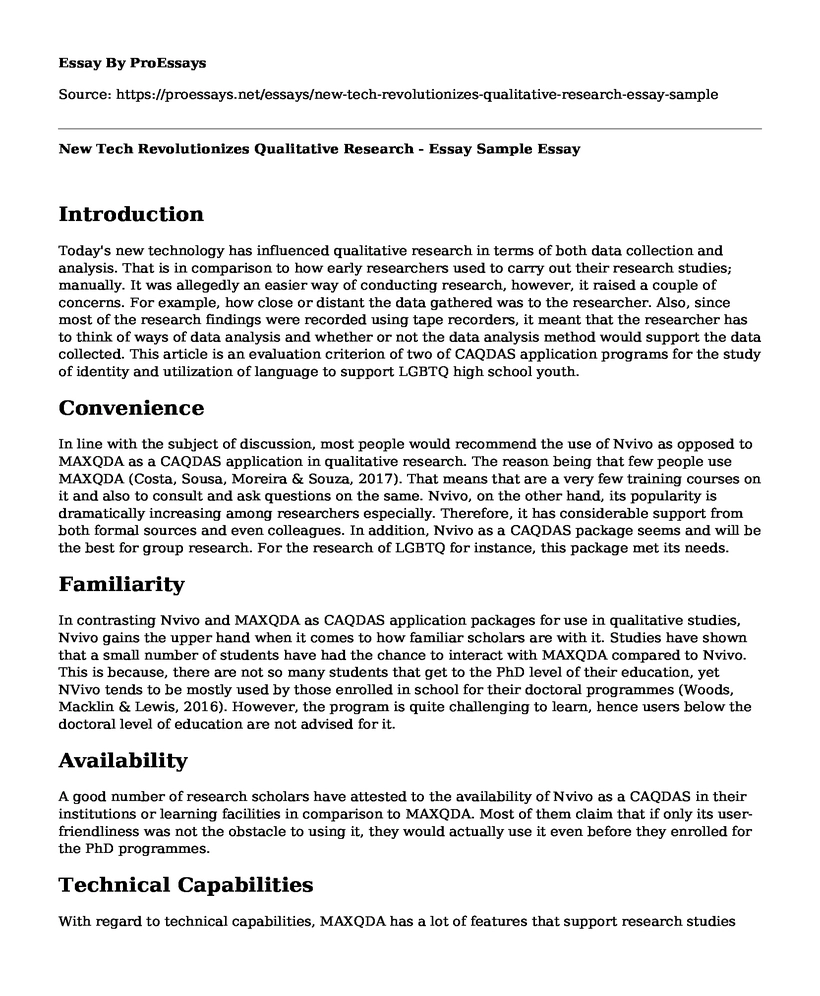Introduction
Today's new technology has influenced qualitative research in terms of both data collection and analysis. That is in comparison to how early researchers used to carry out their research studies; manually. It was allegedly an easier way of conducting research, however, it raised a couple of concerns. For example, how close or distant the data gathered was to the researcher. Also, since most of the research findings were recorded using tape recorders, it meant that the researcher has to think of ways of data analysis and whether or not the data analysis method would support the data collected. This article is an evaluation criterion of two of CAQDAS application programs for the study of identity and utilization of language to support LGBTQ high school youth.
Convenience
In line with the subject of discussion, most people would recommend the use of Nvivo as opposed to MAXQDA as a CAQDAS application in qualitative research. The reason being that few people use MAXQDA (Costa, Sousa, Moreira & Souza, 2017). That means that are a very few training courses on it and also to consult and ask questions on the same. Nvivo, on the other hand, its popularity is dramatically increasing among researchers especially. Therefore, it has considerable support from both formal sources and even colleagues. In addition, Nvivo as a CAQDAS package seems and will be the best for group research. For the research of LGBTQ for instance, this package met its needs.
Familiarity
In contrasting Nvivo and MAXQDA as CAQDAS application packages for use in qualitative studies, Nvivo gains the upper hand when it comes to how familiar scholars are with it. Studies have shown that a small number of students have had the chance to interact with MAXQDA compared to Nvivo. This is because, there are not so many students that get to the PhD level of their education, yet NVivo tends to be mostly used by those enrolled in school for their doctoral programmes (Woods, Macklin & Lewis, 2016). However, the program is quite challenging to learn, hence users below the doctoral level of education are not advised for it.
Availability
A good number of research scholars have attested to the availability of Nvivo as a CAQDAS in their institutions or learning facilities in comparison to MAXQDA. Most of them claim that if only its user-friendliness was not the obstacle to using it, they would actually use it even before they enrolled for the PhD programmes.
Technical Capabilities
With regard to technical capabilities, MAXQDA has a lot of features that support research studies including its complex software. Apart from that this particular application package is more attuned to initiative discourse analysis. The sophistication of the program makes it a reliable package for coding (Maher, Hadfield, Hutchings & Eyto, 2018). Moreover, MAXQDA is quite budget friendly considering it allows easy analysis of qualitative data and allows the coding used for a particular project to be used it another.
Conclusion
Considering the arguments for and against CAQDAS application packages, it is safe to conclude that their implications largely relies on usage patterns. However, there are loyalists' attitudes, due to the initial experience with one of the software packages, it henceforth seems to be most important for the decision on the specific software package. Of course, when an individual learns to use one software package, of course, learning another can easily be seen as a waste time. Also, they rarely had the encouragement to adventure various capabilities and to compare differences between several software packages.
References
Woods, M., Macklin, R., & Lewis, G. K. (2016). Researcher reflexivity: Exploring the impacts of CAQDAS use. International Journal of Social Research Methodology, 19(4), 385-403.
Maher, C., Hadfield, M., Hutchings, M., & de Eyto, A. (2018). Ensuring rigor in qualitative data analysis: A design research approach to coding combining NVivo with traditional material methods. International Journal of Qualitative Methods, 17(1), 1609406918786362.
Costa, A. P., de Sousa, F. N., Moreira, A., & de Souza, D. N. (2017). Research through design: qualitative analysis to evaluate the usability. In Computer supported qualitative research (pp. 1-12). Springer, Cham.
Cite this page
New Tech Revolutionizes Qualitative Research - Essay Sample. (2023, Feb 22). Retrieved from https://proessays.net/essays/new-tech-revolutionizes-qualitative-research-essay-sample
If you are the original author of this essay and no longer wish to have it published on the ProEssays website, please click below to request its removal:
- The Future Power System - Essay Sample
- Building-Integrated Photovoltaic Research Paper Example
- Western Science and Technology Essay Example
- Harnessing the Hurricane Energy Essay
- Robots in the Food Industry Essay Example
- Natural Power, Ethanol Fueling Nations: Responder Strategies - Research Paper
- Paper Sample on Cybersecurity in the UAE: Analyzing Threats, Techniques, Solutions







